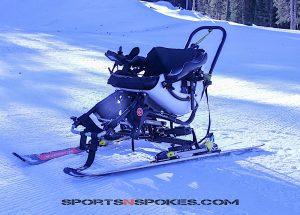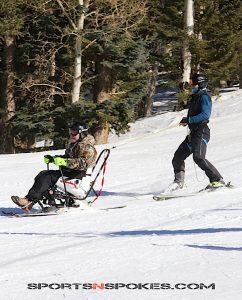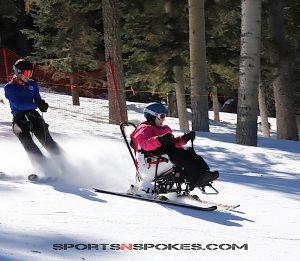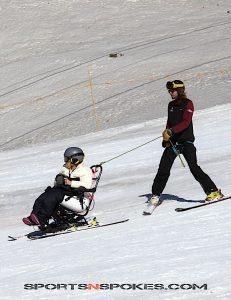Arizona Snowbowl hosts first TetraSki race
Blue skies and a balmy 36 temperature greeted adaptive skiers Feb. 10 at the inaugural qualifier for the Brian McKenna TetraSki Express national championship at Arizona Snowbowl in Flagstaff, Ariz.

It was a welcome change from the day prior, when 80-plus mph hour wind gusts on the slopes caused organizers to cancel a practice day for the six Arizona athletes with complex disabilities who competed in the qualifier, hosted by High Country Adaptive Sports and the University of Utah’s adaptive recreation program, Technology, Recreation, Access, Independence, Lifestyle and Sports (TRAILS) Adaptive.
The giant slalom-style course consisted of six gates, and athletes using a Tessier Snow’Kart or TetraSki, two types of sit-ski devices, had at least one practice run before completing their only timed run. If an athlete missed any of the gates, he or she received a did not finish (DNF). Sam Shivers of Tucson, Ariz., won the qualifier, finishing in 43.53 seconds in a Snow’Kart, edging out Kim Kolstad of Gilbert, Ariz. (44.56 seconds in the TetraSki).

The two sit-ski devices differ in their use. The Snow’Kart has levers on either side of its bucket seat that can be used manually for those who have some upper body strength, but who might not have the balance to use a traditional sit-ski.
The TetraSki is a modified version of the Snow’Kart and has electric actuators on each ski that can be controlled by joystick or sip-and-puff.
TetraSki and Snow’Kart users are paired with a tetherer for safety, but unlike recreational bi-skis and monoskis, the skier remains in full control of the ski’s speed and direction.
Truman Shoaff, High Country Adaptive Sports summer programs director and TetraSki instructor, says the qualifier course was good practice for athletes who choose to compete at the second annual national championship, set for March 24 at Powder Mountain in Eden, Utah.
McKenna, the namesake of the race who died in 2018, was one of the pioneering users when the TetraSki was being developed in 2015 as a University of Utah mechanical engineering senior project.
Among the racers was 11-year-old Lilye Curtis of Casa Grande, Ariz. Curtis, who has a level T3-7 incomplete spinal-cord injury (SCI) from an arachnoid cyst on her spine that paralyzed her at 1 1/2 years old, competed using the Snow’Kart.

At the top of the moderately difficult North Star run, she says she was nervous and excited, but as she was skiing down, she thought about what her instructor, Winter Programs Director Carley Turner, told her.
“She said that if you’re not smiling, you’re not skiing,” Curtis says.
Curtis has skied three times at Snowbowl using a monoski with outriggers, but she liked the Snow’Kart because she felt like she could control it better.
A bit of a speed demon with a competitive streak, she enjoys the independence and says her favorite part was at the end of the course when her speed crept up.
Although she missed several gates and recorded a did-not-finish for the race, it was a good learning experience and she knows what to do next time.
“In water sports, I did water skiing and I just wanted to try something new,” Curtis says. “I just like being able to ski in a different way.” Ellen Ruhlmann also wanted to try something new. The 59-year-old Tempe, Ariz., resident has cerebral palsy and skied with the TetraSki for the first time.

She has skied with a bi-ski eight times, with the first time in 1988 at Snowbowl, but she liked that she can control the TetraSki and it’s faster and more comfortable.
She placed fourth in the qualifier and hopes to arrange it so she can go to the national championship this year to help carry on McKenna’s legacy.
“It’s kind of incredible how an unfortunate experience that someone who loved skiing had transformed the situation for disabled people all over the world, and I find that very inspiring,” she says.
Inspiring others with serious injuries and complex disabilities to explore the mountains is exactly what McKenna would have wanted, according to his mom, Mary Anne McKenna.
After sustaining a level C4 spinal-cord injury in a 2015 mountain biking accident in Deer Valley, Utah, Brian began participating in the TRAILS Adaptive program and teamed up with Jeffrey Rosenbluth, MD, the SCI medical director at the University of Utah and director of innovation at the Craig H. Neilsen Rehabilitation Hospital in Salt Lake City, to help develop the TetraSki.
“He really was the test dummy. That was his insistence,” she says. “But he loved every minute of it. He was an extreme sportsman, so he loved it.”
After Brian’s death in 2018, Mary Anne says Rosenbluth proposed the idea of creating the national championship to honor his spirit.
But Rosenbluth’s team is also on a mission to see the sport in the Paralympics, and Mary Anne says Brian would be thrilled about the qualifier and expansion of the race.
“So, all these regional things that are starting to pop up are going to make a big step towards making it a national and we’re working on international name … Quadriplegics, higher-level injury people should be able to do everything the [Paralympians] can do.”
For more information, read the March issue of SPORTS ’N SPOKES. For information on the TetraSki, visit Tetradapt (tetradapt.us).
For information on the Brian McKenna TetraSki Express national championship, visit tetraskiexpress.us.
Qualifier Finish Times
| Place | Name | Equipment | Time |
|---|---|---|---|
| First-Place | Sam Shivers | Snow'Kart | 43.53 |
| Second-Place | Kim Kolstad | TetraSki | 44.45 |
| Third-Place | Brian Rossi | TetraSki | 45.97 |
| Fourth-Place | Ellen Ruhlmann | TetraSki | 46.60 |
| DNF | Carsten Wood | TetraSki | Did Not Finish |
| DNF | Lilye Curtis | Snow'Kart | Did Not Finish |